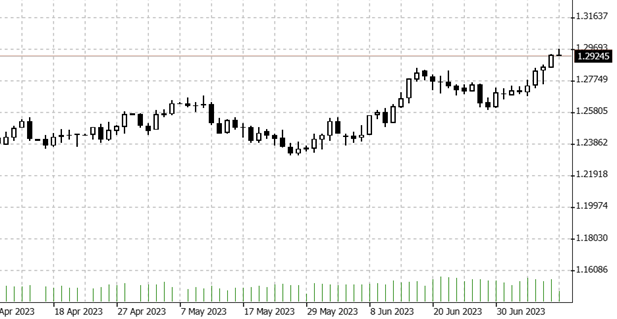

12.07.2023 – The market firmly believes that inflation in the USA will fall. This would give the Federal Reserve fewer arguments to raise interest rates. The dollar falls, equities rise, the yield on US government bonds falls. And above all, sterling is gaining against the greenback.
By this Wednesday afternoon, we’re all smarter: the majority of analysts expect annual core Consumer Price Index in the U.S. to slip from 5.3 to 4.9 percent – will be the third consecutive decline. On a month-on-month basis, the consensus stands at plus 0.2 percent.
Declining inflation?
If the numbers come in like that, or even weaker, it would give the Fed less of a case for another rate hike. The stock market would celebrate disinflation. But if inflation turns out higher, there could be a damper on the rate front for now. “Our economist expects a consensus 0.3% month-on-month core read, which should keep providing encouraging news on the disinflationary story – but should still fall short of tweaking the Fed narrative or convincing markets to price out a July hike,” ING analysts judged.

Source: Bernstein Bank GmbH
The trade on inflation expectations in the GBPUSD currency pair will be particularly interesting. Sterling just climbed to a new 15-month high – the picture above shows the daily chart. On the island here, investors expect further interest rate hikes. That’s because inflation in the U.K. is at 8.7 percent – the highest inflation in Western industrialized countries. Wages on the island are rising rapidly.
At the same time, the Bank of England’s Financial Stability Report stated that financial institutions in the UK are “strong enough” to deal with the risk of rising mortgage rates. Ergo, banks can probably absorb bad loans well. This doesn’t look like the central bank cares about homebuilders.
Expensive mortgages
We had already talked about this topic: In the U.K., most mortgage loans are floating rate or, at best, short-term. When the prime rate rises, it gets expensive for households. Which can lead to a recession, because consumers drastically cut back on consumption. The experts at Moneyfacts found out exactly how expensive it will be: according to them, the average two-year fixed interest rate costs 6.66 percent. That is the highest level in 15 years.
The conclusion from all this: GBPUSD is currently an interesting currency pair in terms of monetary policy. Whether long or short – we wish you successful trades and investments!
_______________________________________________________________________________________________________________________________
The content of this publication is for general information purposes only. In this context, it is neither an individual investment recommendation or advice nor an offer to purchase or sell securities or other financial products. The content in question and all the information contained therein do not in any way replace individual investor- or investment-oriented advice. No reliable forecast or indication for the future is possible with respect to any presentation or information on the present or past performance of the relevant underlying assets. All information and data presented in this publication are based on reliable sources. However, Bernstein Bank does not guarantee that the information and data contained in this publication is up-to-date, correct and complete. Securities traded on the financial markets are subject to price fluctuations. A contract for difference (CFD) is also a financial instrument with leverage effect. Against this backdrop, CFD trading involves a high risk up to the point of total loss and may not be suitable for all investors. Therefore, make sure that you have fully understood all the correlating risks. If necessary, ask for independent advice. CFDs are complex instruments and are associated with the high risk of losing money quickly because of the leverage effect. 68% of retail investor accounts lose money trading CFD with this provider. You should consider whether you understand how CFD work and whether you can afford to take the high risk of losing your money.7
